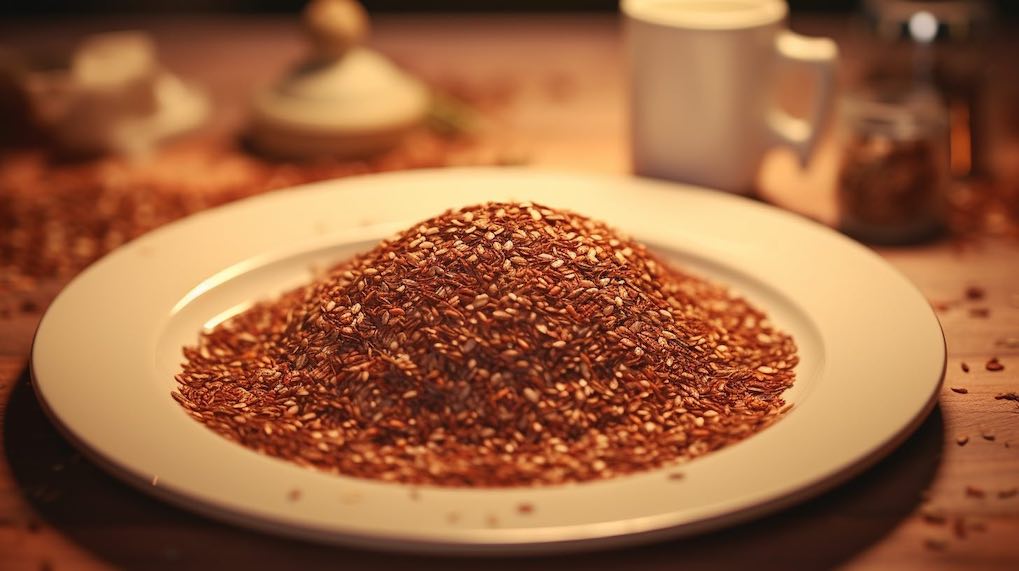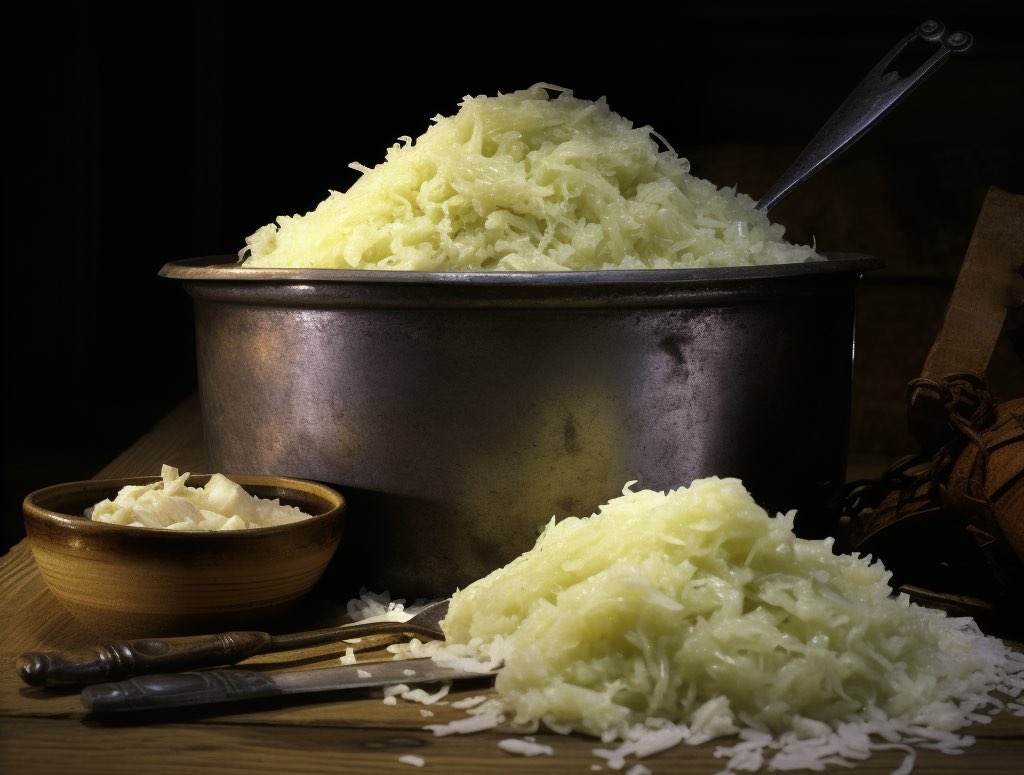Menopause. We all know about those common menopause symptoms. Hot flashes, mood swings, dryness, you name it. And we know the reason is, during menopause, our hormone levels, especially estrogen and progesterone, start to drop, right? But here’s something you might not know. Menopause, gut health and estrogen are connected. Our gut health might be a key player in managing these symptoms because it is linked to your estrogen metabolism.
Recent research is shedding light on how the tiny microbes in our gut could actually help in balancing our hormones during menopause. Imagine that. The billions of bacteria residing in our gut could be helping us navigate through menopause more smoothly.
If our gut health is good, these bacteria work smoothly, helping to maintain a more balanced level of estrogen. But if our gut health is off, like if we’re eating the wrong foods or we’re super stressed, these bacteria might not work as well.
This can lead to an imbalance in estrogen levels which, you guessed it, can make menopause symptoms feel worse.
Are there gut bacteria that can help you balance estrogen?
Yes, that’s right. The gut bacteria I’m talking about are called the estrobolome, which is a group of bacteria specifically involved in metabolizing estrogen. They are the link between your menopause, gut health and estrogen levels. Let’s dive into this.
Which bacteria belong to the estrobolome?
The estrobolome encompasses a variety of bacteria within the gut microbiome that are capable of metabolizing estrogens. While research is still evolving in this area, some of the known bacteria that are considered part of the estrobolome, include:
Bacteroides. These are bacteria that are involved in breaking down estrogen into its metabolites.
They play a key role in maintaining estrogen balance within the body.
Clostridia. This group of bacteria, particularly certain species within the Clostridia class, are involved in the process that transforms estrogen into a form that the body can reuse or eliminate. It’s like peeling off labels from a bottle, so it can be used again in a different way. It is crucial for the recirculation of estrogens in the body.
Bacteria that produce beta glucuronidase. While not a specific type of bacteria, this functional group is important. Beta glucuronidase is an enzyme produced by certain gut bacteria and it helps in the process of deconjugating estrogens so that they can be reabsorbed by the body into the bloodstream.
Eubacterium. Some species within this genus are known to have beta glucuronidase activity contributing to the metabolism of estrogens.
Lactobacillus. Certain Lactobacillus species are thought to play a supportive role in maintaining a healthy estrobolome. They may not directly metabolize estrogens, but they contribute to a balanced gut environment that supports the overall function of the estrobolome.
Enterococcus. Some species of enterococcus are also involved in estrogen metabolism, and they contribute to the overall balance of estrogens in the body.
Bacteria Work in the Estrobolome is Team Work!
These bacteria work collectively to maintain the balance of estrogen in the body by regulating the metabolism and excretion of this hormone. The balance and diversity of these bacteria are crucial for effective estrogen metabolism. And the good news is that you have a say in that. You can influence it with what you eat, what your lifestyle is, and how to deal with stress.

From feeling dry & anxious back to feeling normal and happy again in everyday activities.
Mae is a 100% natural, chemical-free vaginal suppository used to moisturize the vagina from the inside. Made for women experiencing vaginal dryness and safe for long-term usage. Comfort, control, re-assurance, and re-connecting. Mae is for all women with vaginal dryness, at all ages. It is recommended by leading Pelvic Health Therapists in North America. Mae soothes, moisturizes, balances the pH and supports the skin flora and the natural skin barrier. Ideal for Perimenopause and Menopause. Learn more…Can your gut bacteria make estrogen when you are in menopause?
When you hit menopause, your ovaries start to slow down on making estrogen. Now, the estrobolome, which is basically a bunch of gut bacteria that can help you with your estrogen, doesn’t whip up new estrogen for you. What it does, however, is pretty cool, though.
It works on the estrogen that’s already floating around in your body, plus the stuff that comes from your diet, like phytoestrogens from certain plants.
It’s all about making sure the estrogen you have is used in the best way possible, especially when your body’s own production of it is winding down during menopause.
And these gut bacteria tweak and adjust this estrogen. They’re not making more of it, but they’re helping your body use it better.

Menopause, Gut Health And Estrogen Levels
Is your gut connected to your estrogen levels, so it can make estrogen in your food more bioavailable?
Yes, that’s a good way to look at it. The estrobolome, which is part of your gut microbiome, plays a significant role in making estrogen more bioavailable, including the estrogens that come from your diet.
Let’s break it down a bit.
First off, there are these things in some foods called phytoestrogens. They come from plants and kind of act like estrogen in our bodies. You’ll find them, for instance, in flaxseeds.

Now, when you eat foods that have these phytoestrogens, they go into your digestive system. That’s where your gut bacteria, including the ones in the estrobolome, jump into action.
They start breaking down these phytoestrogens, which might make them easier for your body to use.
So because of this breakdown by the gut bacteria, these phytoestrogens become more bioavailable. This just means that your body can absorb and use them better, kind of like how it would use its own estrogen.
And here’s the key point. This is super important during menopause. When your natural estrogen levels start dropping, these plant based estrogens can step up a bit. They’re not exactly like your body’s estrogen, but they can help out with some of the stuff that estrogen usually does.
You Are in Menopause And Want Help with Your Estrogen?
Help Your Gut Bacteria Because They Can Actually Help You.
And here are three pointers how. There is diet, active lifestyle, and stress management. Let’s look at diet a bit more in detail. I have two videos for exercising and gut health and for stress management for gut health. This is amazing content. Also, you find the related blog posts here and here.
How do you feed your estrogen helping gut bacteria, the estrobolome?
To improve your estrobolome is particularly important for hormonal balance, especially when you are in menopause. When you’re looking at boosting specific gut bacteria like Bacteroides, Clostridia, Enterococcus, and Eubacterium, it’s more about your overall eating habits than just chowing down on certain superfoods. What you eat regularly makes a big difference.
Eating the right kinds of food feeds these good bacteria and helps them grow strong. If you’re into the paleo diet, that can work great here. This way of eating is all about natural, unprocessed foods, and that’s pretty good for your gut bacteria. So, sticking to a paleo diet is a cool way to make sure your estrobolome is getting what it needs to help with your hormones during menopause.
I generally recommend a paleo diet.
By the way, something for you, a little gift!!!
I am just in the middle of publishing my book. It’s about How women can balance their hormones. One part is about food and diet, of course.
Follow this link and enter your email.
I will send you this part of the book for free once the book is published. It has many concrete, practical tips and recipes and will help you feel better during menopause or times of Big hormonal fluctuations.
Annette, Damiva Lead for Health & Wellness

Paleo Diet: Great for Menopause, Gut Health and Estrogen Metabolizing Bacteria
High Fiber Foods.
You’ve got loads of fiber options. Fruits and veggies, they’re your best friends here. They’ve got tons of fiber to keep those good bacteria in your gut well fed. Bacteroides love munching on the fibers found in fruits and veggies. So load up on things like leafy greens, broccoli, carrots, apples, and berries. These aren’t just tasty, they’re packed with the kind of fiber that keeps your gut bacteria happy. This helps them do their thing with estrogen, which is super important, especially when menopause hits.
Fermented Foods.
You’ve got sauerkraut and kimchi. These are fermented, right? These foods have got those beneficial cultures that can help your overall gut health and indirectly boost the good guys like bacteroides and clostridia. Fermented foods are packed with good bacteria, which are your probiotics. And for prebiotics, you’ve still got stuff like bananas, onions, and garlic. They’re like a feast for the good bacteria you already have. These foods have got those beneficial cultures that can help your overall gut health and indirectly boost the good guys like bacteroides and clostridia.

Diverse Diet.
Diversity is the name of the game for a happy gut. Stick to a wide range of fruits, veggies, nuts, and seeds. Each of these brings something different to the table, literally, for your gut bacteria. More variety means a happier, healthier microbiome.
Polyphenol Rich Foods.
Polyphenols are special compounds that plants make and they are known for being antioxidants. This means they help fight off free radicals, these little troublemakers in our body that can cause damage to our cells. By fighting off these free radicals, polyphenols help keep our bodies healthy. But not only that, foods high in polyphenols are great for your gut. We’re looking at things like berries, nuts, seeds, olive oil, and green tea. They’re not just delicious, they also help the good bacteria in your gut thrive.
Stay Hydrated.
This one’s simple. Drink plenty of water. It helps everything in your gut move along smoothly and keeps those bacteria happy.
Cut down on processed stuff and sugar.
Even on paleo, it’s easy to sneak in comfort foods and sugars from dried fruits or so. Try to keep those to a minimum. They can mess with your gut bacteria big time.

Lifestyle Tips for better Menopause Gut Health & Estrogen Levels
Keep Moving. Exercise isn’t just about staying fit. It’s great for your gut, too. It helps mix up the bacteria in there, keeping your gut diverse and healthy. Read this blog post about how exercise is related to gut health and hormone levels!
Manage stress. We all know stress is a gut wrecker. Find your chill with things like yoga or just some good old relaxation. Keeping stress down is a big thumbs up for your gut health. Read here how stress affects your hormones, especially when you are in menopause.
Stay away from chemicals that disturb your hormone system, like the chemicals in water based lotions and moisturizers. Choose 100 percent natural, chemical free, water free products.
I have two videos, one for exercise to improve your gut health and one how stress messes up your gut health, both with plenty of tips and strategies that will help you in menopause.

Feeling You Have a Right to Safe Beauty & Fem Care?
If so, it may be time for a change. It starts with knowledge. We have a few suggestions in our new guides.
Menopause, Gut Health and Estrogen Balance Take Patience
Remember, changing up your diet and lifestyle doesn’t happen overnight. Take it slow, make small changes, and see how your gut feels. And of course, if you’re shaking things up a lot with your diet or lifestyle, it’s a smart move to chat with a health care provider. They can make sure everything you’re doing fits with your health needs, especially with menopause in the mix.
A healthy gut means a better chance of keeping those pesky menopause symptoms at bay. It’s all about creating a harmonious environment inside our bodies where our gut and hormones can work together in peace. By nurturing our gut health, we’re taking a step towards managing menopause symptoms and maintaining our hormone health.
It’s an empowering way to take control of our during this phase of life. Remember to share this blog post with your friends and family and anyone you know could benefit from it.







